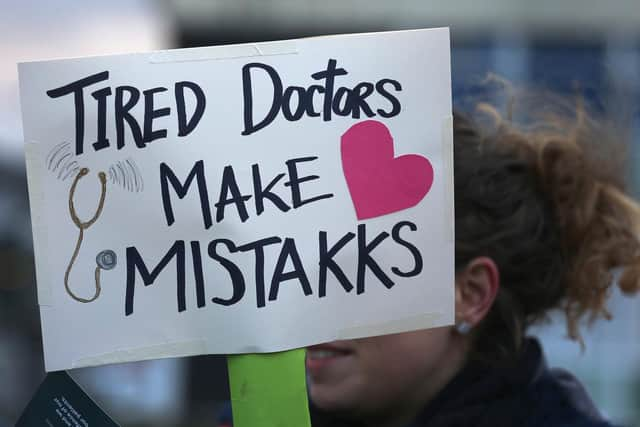NHS Covid crisis: Scotland's junior doctors are exhausted, overworked and overlooked – Dr Lailah Peel
As a patient in hospital, whether in A&E or on the wards, most of the doctors you encounter will likely be junior doctors, especially overnight or on weekends.
Despite this, I often feel like junior doctors are the forgotten members of the NHS workforce; we rotate between departments, hospitals and health boards so frequently that we are sometimes regarded as temporary workers, even by the teams we work within.
Advertisement
Hide AdAdvertisement
Hide AdOften along with that can come complacency in terms of our well-being, even on the simplest terms, like getting our breaks and rotas on time.
We recently carried out a snap survey of junior doctors across Scotland and it concerned me hugely, although admittedly I was not surprised, that only 14 per cent reported always getting their breaks when they should. Worryingly, this dropped to nearly five per cent for first and second-year junior doctors. This isn’t a new problem, but one that has definitely been exacerbated by the pandemic and the widespread impact it has had on the NHS.
I cannot say it enough: doctors must be able to take their breaks for the safety of patients and doctors alike. We may have been called heroes, but we are not superhuman. We need breaks to recharge, refuel (with food or vital caffeine) and to reset.
We need breaks in order to give our patients the best care we can and ensure we work in an environment that is as safe as possible for everyone.


A doctor who is functioning on little to no rest, hasn’t had a drink of water let alone eaten in 12 hours is simply not going to be able to provide the quality of care they want, and our patients need. In short, who would you prefer caring for you or a loved one? A doctor who was able to take their breaks, or one who hasn’t and is running on fumes? I suspect I know what most of you would prefer.
I’ve spoken a lot about junior doctor well-being recently and it’s something I keep going on about to my colleagues. What I’m hearing are tales of low morale and absolute exhaustion.
Many are too tired to fight to get their work rotas on time, not knowing if they can make it to their sister’s wedding, or even their own, not knowing which weekends and nights they will be working until a matter of days before or when they could take some much-needed time away from work.
For the health and well-being of our NHS, the health and well-being of those who are integral to the running of it must be prioritised. Is it too much to ask that a doctor is given their working rota six weeks in advance? Our survey showed more than two thirds of junior doctors are not getting their rota when they should.
Advertisement
Hide AdAdvertisement
Hide AdWe need to do more. Our NHS deserves better. Our doctors deserve better. Our patients need the best and safest possible care. Next time you find yourself in a hospital take a look around: you will see junior doctors everywhere – exhausted, overworked and, sadly too often, overlooked.
Dr Lailah Peel is chair of BMA Scotland’s junior doctors committee
A message from the Editor:
Thank you for reading this article. We're more reliant on your support than ever as the shift in consumer habits brought about by coronavirus impacts our advertisers.
If you haven't already, please consider supporting our trusted, fact-checked journalism by taking out a digital subscription.
Comments
Want to join the conversation? Please or to comment on this article.
